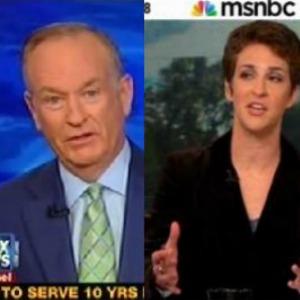BOB GARFIELD: Hey, post-election everyone else is doing it, so let’s play the Metaphor Game. The presidential campaign created a tsunami of negativity, in the form of TV advertising, from the campaigns and their Super PAC proxies. But did the media provide a safe harbor from the churning seas, a placid refuge, a quiet cove? No!
The Pew Research Center's Project for Excellence in Journalism looked at the tone of election coverage during the last weeks of the campaign and found that in the mainstream media negative coverage of the candidates far outweighed the positive. Mark Jurkowitz, associate director at the Project for Excellence in Journalism, says the negativity peaked on the cable news channels.
MARK JURKOWITZ: So not only was Romney treated harshly, very harshly by MSNBC, not only was Obama treated very harshly on Fox, they were the brunt of the overwhelming majority of the coverage, meaning these channels would rather talk about the guy they were more critical of them the guy that they obviously were a little more accepting of. And that’s significant.
BOB GARFIELD: We began with tsunamis. Let’s move to horse races, the kind of coverage that we frequently, almost reflexively decry because we don’t think it’s very illuminating. But your numbers showed that things improved a bit.
MARK JURKOWITZ: And that's a little bit of good news for a lot of people who are sort of concerned about campaign journalism. The horserace coverage was still the biggest component. It was almost 40% of all the coverage that we measured. That's not nothin’. But if we compare it, for example, to 2008, that – that horserace coverage was over 50%. So there's a drop of about 15 points there.
Now it's worth noting – here’s something that tempers the good news. Does that mean that somehow 15 points got sort of eaten up with more substantive coverage on the issues, for example, or the public records of the candidates? Not really.
BOB GARFIELD: What do your data show about policy coverage?
MARK JURKOWITZ: About a fifth of the conversation was about policy this year, pretty much what it was in 2003. It pretty much dovetails with the traditional number. That’s not a lot, obviously, and it pales in comparison to horserace. What makes it a little more problematic maybe is within that 20% we had a very narrow range of issues that got discussed.
Let’s talk about domestic policy for a minute. It was the economy, the economy, the economy. What was missing in domestic politics? The healthcare debate, immigration.
What might even be more striking, frankly, is on the foreign policy side. What didn't get covered? Iraq. All right, that’s a little understandable; that war has wound down. What got even less coverage than Iraq? Afghanistan, relations with China, which may be the most important bilateral issue for the United States.
What did get covered? The Benghazi attack that killed four people, including our ambassador. And why was that a top story? Not because Libya is front of mind in policy issues, but because that became a politicized issue. So what this shows us here is that for a foreign-policy issue in particular, to get traction in the news media, it, in essence, has to become almost part of the horserace. It has to become politicized. We have to have people arguing about it for both sides.
BOB GARFIELD: All right Mark, we’ve discussed mainstream media ‘til now and we, of course, are living in a much differently mediated world. And you found a place that was more negative than cable, more negative maybe then the TV ads, and that place is?
MARK JURKOWITZ: Social media, and particularly Twitter. It is overwhelmingly negative and tends to n – and in this case was negative toward the two candidates throughout the home stretch of this campaign. And it is essentially often unmoved or unchanged, when it comes to tone, by events that are actually happening on the ground. There's very little volatility in the kinds of conversation we see about the candidates. It remains negative, you know, whether somebody's had a good week or a bad week.
It’s very unlike the mainstream, in that sense, in that one of the things, just as a sort of addendum here, that we clearly found in this campaign is big events do matter. You know, for those who thought conventions were passé, who think debates were passé, we’ve seen them have profound impacts on the mainstream media narrative. That’s not the case with the social media nearly as much. This is a medium that is relatively impervious to the day-to-day events that the mainstream media’s so ferociously searching for, to see if there's any kind of a game changer.
BOB GARFIELD: You know, we didn’t invoke fiscal cliff.
MARK JURKOWITZ: I know.
BOB GARFIELD: So that’s one metaphor we missed. Mark, as always, thank you very much.
MARK JURKOWITZ: Good to talk to you, man. Take care.
BOB GARFIELD: Mark Jurkowitz is Associate Director at the Project for Excellence in Journalism.
[MUSIC UP & UNDER]
